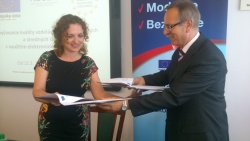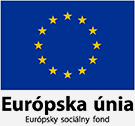First School Signs Framework Contract with NÚCEM

The first school has officially joined the nationwide project "Increasing the quality of primary and secondary education with the use of electronic testing".
Today, 13th May 2013, the Director of the National Institute for Certified Educational Measurements (NÚCEM) Romana Kanovská, accompanied by the Head of European Commission Representation in Slovakia, Mr. Dušan Chrenek, and the State Secretary of the Ministry of Education, Science, Research and Sports, Mr. Štefan Chudoba, has signed the first contract on cooperation in the project with Mr. Pavel Sadloň, principal of Secondary Grammar School on Ladislava Sáru st. in Bratislava. The representatives of NÚCEM have also announced a contest for secondary school students, the goal of which is to create a logo of the ongoing national project.
Through electronic testing and a new type of tasks, the project will provide schools with faster, more efficient and more objective feedback, will contribute to increasing the quality of education and help better prepare students for the highly competitive European labour market. The project is designed for both secondary schools and fully-organised elementary schools, as well as for creative teachers - individuals, who are the authors of e-tasks and tests.
The project consists of two phases. In the first one, a selected group of about 500 teachers from all over Slovakia will create modern tasks and tests that will measure the students' understanding of the subject matter. "We will train the teachers in developing new tasks and tests under the supervision of experts. The teachers will receive financial rewards for the tasks development," Director Kanovská said and added that the project also takes into account the effective use of computer technology in the new tests for students with disabilities.
In the second phase of the project, the already-developed tasks and tests will be verified and used by participating schools. Principal Sadloň believes the project is an opportunity for more effective and meaningful utilisation of modern information and communication technologies. "I am convinced that there are still many skilled teachers in Slovakia who will use their knowledge, skills and years of experience and get involved in the development of this really essential database of tasks and tests. I see this project as a chance to make the demand on students' knowledge more objective and to identify permanent knowledge of students at various stages of the educational process," Sadloň said. Director Kanovská added that by implementing this project Slovakia follows the world trends, e.g, since 2015, the OECD international study of 15-year-old students' knowledge PISA will be carried out only electronically in OECD member states.
Today, 13th May 2013, the Director of the National Institute for Certified Educational Measurements (NÚCEM) Romana Kanovská, accompanied by the Head of European Commission Representation in Slovakia, Mr. Dušan Chrenek, and the State Secretary of the Ministry of Education, Science, Research and Sports, Mr. Štefan Chudoba, has signed the first contract on cooperation in the project with Mr. Pavel Sadloň, principal of Secondary Grammar School on Ladislava Sáru st. in Bratislava. The representatives of NÚCEM have also announced a contest for secondary school students, the goal of which is to create a logo of the ongoing national project.
Through electronic testing and a new type of tasks, the project will provide schools with faster, more efficient and more objective feedback, will contribute to increasing the quality of education and help better prepare students for the highly competitive European labour market. The project is designed for both secondary schools and fully-organised elementary schools, as well as for creative teachers - individuals, who are the authors of e-tasks and tests.
The project consists of two phases. In the first one, a selected group of about 500 teachers from all over Slovakia will create modern tasks and tests that will measure the students' understanding of the subject matter. "We will train the teachers in developing new tasks and tests under the supervision of experts. The teachers will receive financial rewards for the tasks development," Director Kanovská said and added that the project also takes into account the effective use of computer technology in the new tests for students with disabilities.
In the second phase of the project, the already-developed tasks and tests will be verified and used by participating schools. Principal Sadloň believes the project is an opportunity for more effective and meaningful utilisation of modern information and communication technologies. "I am convinced that there are still many skilled teachers in Slovakia who will use their knowledge, skills and years of experience and get involved in the development of this really essential database of tasks and tests. I see this project as a chance to make the demand on students' knowledge more objective and to identify permanent knowledge of students at various stages of the educational process," Sadloň said. Director Kanovská added that by implementing this project Slovakia follows the world trends, e.g, since 2015, the OECD international study of 15-year-old students' knowledge PISA will be carried out only electronically in OECD member states.





